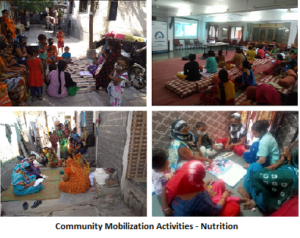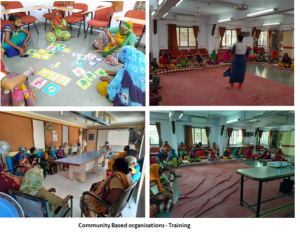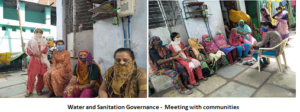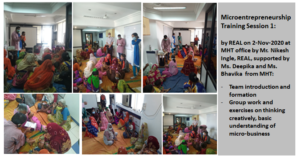Women & Adolescent Girls Led Approach for Food & Nutrition Security in Urban Slums
This project aims to promote nutrition among urban slums through knowledge/awareness building among community, creating a ground level health champions as master trainers and microentrepreneurship among community to provide nutritious food
Improve health & well-being of slum dwellers through integrated nutrition & WASH intervention coupled with micro-entrepreneurship for nutrition – addressing Demand and Supply factors as follows:
- Pull or Demand: Generate awareness and knowledge among communities to for nutritious food & better hygiene. Create Master Health Trainers and Counselors from within community to regularly update and counsel community members on nutrition and hygiene, particularly for mothers and young children. These steps create a strong Pull or demand for nutrition and hygiene within communities.
- Push or Supply: Create and nurture women microentrepreneurs from community, to make and supply nutritious food items to community and outside. This creates the Push or supply of nutritious food items to fulfil the demand and also create livelihoods and economic value-add within the community.
- Through above, create a replicable and sustainable model for other places.
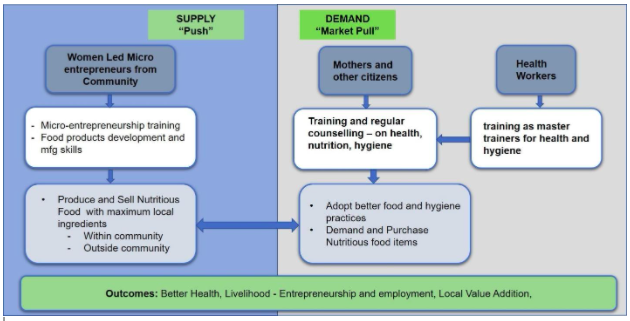
WIN foundation is supporting for the following activities to o address the issue of inadequate dietary intake
Following interventions will be carried out to achieve the project objectives:
- Mass awareness event (Mela/Mega Event)
These events will be organised in slums with the concept of “Learn with Fun”, using creative Information Education Communication (IEC) tools to engage target group (adolescent girls, pregnant women, lactating mother etc.). Activities like health camps, stalls of nutritious food products, facilitating access to government schemes, games and competitions, will be carried out. - Training of Trainers on Nutrition:
- to be led by SMDT, supported by MHT for ground level coordination, and follow up:
- Training on nutrition for 1st 1000 days starting from conception, including mother’s nutrition, new born nutrition by mother’s feeding and subsequently additional food – upto approx. 2.5 years of age.
- Food & Recipe Demonstration:
Share recipes of simple home-made nutritious food items with the target audience to encourage healthy and nutritious food habits. - Capacity-building of women groups:
Consisting of women leaders from slum, adolescent girls and members of Mahila Arogya Samiti, these groups will be trained with focus on three major topics; Nutrition & Anaemia, Maternal Health, Sanitation & Hygiene. Training will also enable them to access nutrition and health entitlements, by increasing their knowledge and awareness. - Celebrating Mamta Divas:
Educational and awareness campaigns would be undertaken among women and girls to promote regular ante-natal check-ups, immediate breast-feeding, family planning, referral care, Haemoglobin check-up and finally safe deliveries in facilities of their choice. - Tracking of health parameters among the target population over same period as above.
Hygiene awareness and practices through WASH programming (Led by MHT):
- Water & Sanitation Governance: Formation & training of Community Based Organisations, Community mobilization to set platform for community led interventions
- Information Education & Communication Campaign (WATSAN): Importance of using toilet, Education on hand washing with soap, Promoting safe good hygiene practices
- Water Management: Water Quality Testing & Monitoring by Community, Promoting use of proven water treatment methods, Preventing water contamination through safe storage.
- Access to improved sanitation (individual toilet): encouragement to construct individual toilets
- Preliminary assessment of hygiene status and initial steps: Deworming, Identification of major illnesses and possible support (e.g. Anaemia)
- Microentrepreneurship for Nutrition
- to be led by REAL, supported by MHT
- Identification of potential micro-entrepreneurs from the community willing to undertake entrepreneurship, access their capabilities, and then progressively train them in various aspects of business to setup and operate their micro-enterprise.
- Facilitating tie ups and collaboration for product testing and packaging related support.
- Over a period of upto 1.5 years, support them with necessary advice / inputs for all aspects of business like supply chain and production, packaging, quality control, regulatory approvals. sales, marketing, branding, HR, Finance etc., and track their progress on all these parameters to help and guide them to grow.
Project Outcomes:
- High awareness and positive attitude towards health and hygiene among the community
- Pool of Master Health trainers and counsellors from among the community to work within the community for better health and nutrition in long term.
- Increase in percentage of slum population using safely managed drinking water and sanitation facilities
- Decrease cases of undernutrition among vulnerable groups of targeted communities.
- At least a few successful microentrepreneurs to provide livelihood and improve quality of life within the community and build role models within community.
About Project Partners :
Mahila Housing Sewa Trust:
MHT has 25 years of experience in area of Water & Sanitation and brings in demonstrated expertise to support disenfranchised communities to build social capital and empower them with technical knowledge to affect change. MHT is working in 34 cities across 8 states in India and collaborating with partners in Bangladesh and Nepal. It the last 25 years, MHT has created social capital in the form of 15,000+ community women leaders spread across 1000+ settlements.
For more details, visit MHT website
Rural Entrepreneurship and Livelihood Foundation:
REAL is a social impact startup which promotes micro-entrepreneurship among poorer communities to make products and services for community, to achieve dual purpose of (i) enabling microentrepreneurs to increase their income and (ii) enabling community members to their quality of life.
For more details, visit REAL website
Shrimati Malati Dahanukar Trust:
Shrimati Malati Dahanukar Trust (SMDT) was established in 1960 to address the community educational needs in Shrirampur, Maharashtra. While continuing to address education, SMDT widened its scope to include women and child welfare and environment & sustainability since 2012.
SMDT has been helping children get their rights to a healthy childhood and access to quality education. By empowering the women and self-help groups it is achieving financial parity among villagers to avail healthcare, education and nutrition. Through its various sustainable initiatives, SMDT is ensuring that we inhabit a healthier environment where animals are treated with as much care and concern as we enjoy.
For more details, visit SMDT website

